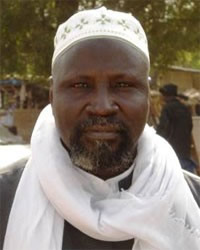Jahanka in Gambia

Photo Source:
Copyrighted © 2026
GoWestAfrica All rights reserved. Used with permission |
Send Joshua Project a map of this people group.
|
| People Name: | Jahanka |
| Country: | Gambia |
| 10/40 Window: | Yes |
| Population: | 6,300 |
| World Population: | 138,300 |
| Primary Language: | Jahanka |
| Primary Religion: | Islam |
| Christian Adherents: | 0.10 % |
| Evangelicals: | 0.05 % |
| Scripture: | Translation Started |
| Ministry Resources: | No |
| Jesus Film: | No |
| Audio Recordings: | Yes |
| People Cluster: | Manding |
| Affinity Bloc: | Sub-Saharan Peoples |
| Progress Level: |
|
Introduction / History
The Jahanka have been Islamic holy men primarily located in Senegal, Guinea and The Gambia. As holy men (Muslim clerics) they conduct Islamic worship rituals and provide Koranic teaching in the villages. Often the clerics also maintain farms which are cultivated by young boys who receive education in the Koran in exchange for their labor.
What Are Their Lives Like?
However, when they lost their slaves, they had to devote more time to farming and less time to religious studies.
Jahanka people value education and scholarship and are known for their success in commerce and other professions. However, as urbanization has accelerated, the Jahanka people have become more dispersed, and the pressures of modernization have become more acute.
What Are Their Beliefs?
Their Muslim tradition avoids the notion of jihad (holy war) in favor of pacifism. The Jahanka are very well respected and influential Muslim teachers throughout all West Africa.
What Are Their Needs?
Gospel recordings exist in the language of the Jahanka. Workers can take this resource to the Jahanka people.
Prayer Points
Pray for gospel materials to be easily available in Jahanka communities.
There is an indication there are a few followers of Jesus among the Jahanka. Pray they will be instructed in God's word and will grow into mature disciples of Christ.
Pray the religious Jahanka people will increasingly be drawn to Jesus (whom Muslims call Isa al-Masih) and will have a growing desire to find out more about this man. Pray this desire will be satisfied.